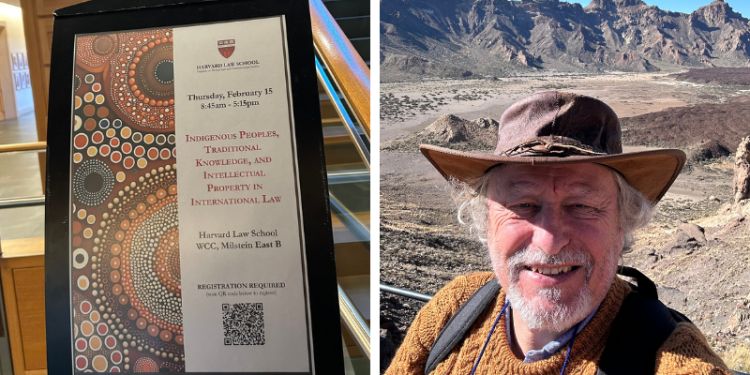School of Law Professor speaks at Harvard conference on Traditional Knowledge and protecting the rights of Indigenous Peoples

In February 2024, Professor Graham Dutfield gave a paper at the Harvard conference 'Indigenous Peoples, Traditional Knowledge and Intellectual Property in International Law.'
Traditional knowledge (TK) encompasses wisdom, practices, and skills passed down through generations within a community, closely tied to its spiritual and cultural identity. Native American tribes now consider safeguarding traditional knowledge and genetic resources as inseparable from protecting their sacred lands.
The conference, hosted by Harvard Law School’s Project on Traditional Knowledge and Modern Justice, sought to explore the ‘philosophical and doctrinal challenges regarding claims for entitlement-like protection for the creative outputs, cultural goods, and genetic resources of Indigenous peoples and local communities.’
Professor Dutfield’s presentation: ‘Lifeworld, Landscape and Law: From Territoriality to Rights in Knowledge and Culture’ argued that our insistence that treating culture and nature as two completely separate phenomena is the only correct way to understand the world has had huge consequences, of which some have been disastrous for Indigenous groups and the environment.
Professor Dutfield believes that we should respect other peoples’ perspectives which treat culture and nature as inseparable, all life as closely related, and all landscapes as living, cultural and as spiritual. Such relatedness cannot be reduced to property rights as such. It is not necessary that we adopt such worldviews ourselves, but merely that we respect them and that we understand that our laws and policies are derived from worldviews that are so alien to these peoples as to be culturally inappropriate and potentially harmful.
Professor Dutfield argued that, instead of trying to subject legal protection of TK to bounded Eurocentric constructions of intellectual property, control over TK should be treated as an aspect of self-determination of Indigenous Peoples. The right to self-governance would thus embrace legal land ownership from which rights to TK would naturally flow.
He says:
I am highly sceptical that current efforts to draft international treaties which assume that intellectual property law (patents, copyright and trade marks specifically) are the only or best solution to the misappropriation of traditional knowledge and traditional cultural expressions are the right approach.
Professor Dutfield is writing a book titled Lifeworld, Landscape and Law and based on the ideas in his presentation. He hopes to complete it in 2026.
He is a member of the Centre for Business Law and Practice and can be found on Twitter/X: @gmdutfield.
Read more about the conference here.




